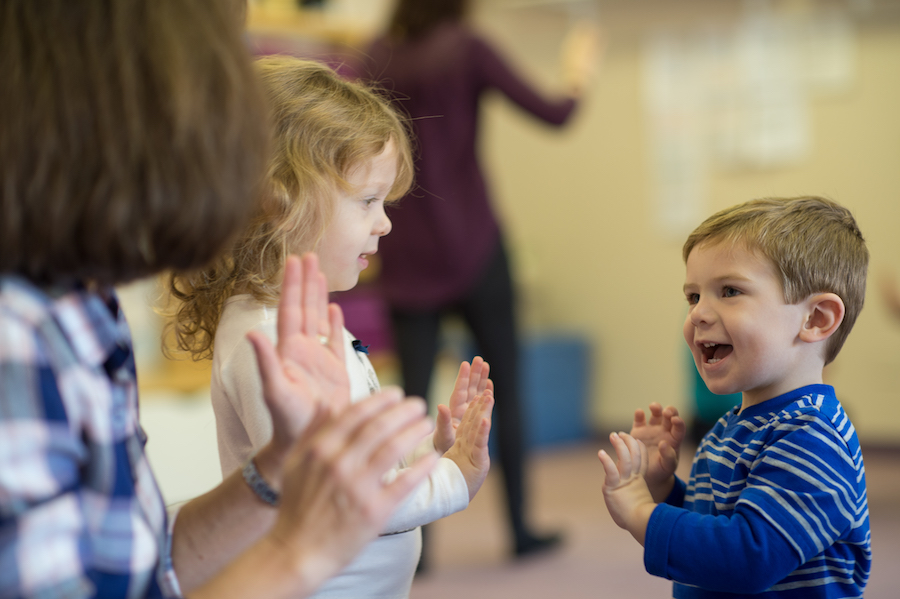[vc_row][vc_column][vc_column_text]A recent article, written by Northwestern music education professor, Steven M. Demorest, over at The Conversation, an “independent source of news and views from the academic and research community, delivered direct to the public,” explored the idea of musical talent.
The most telling fact, one that I have been aware of for most of my career as a choral conductor, is that adults who consider themselves unmusical were often told that they couldn’t sing as children. Prof. Demorest relates part of the story of Sing, an Oscar-winning short film from Hungary about a girl named Zsófi.[/vc_column_text][/vc_column][/vc_row][vc_row][vc_column][vc_column_text]
Sing tells the story of young Zsófi, who joins a renowned children’s choir at her elementary school where “everyone is welcome.”
Soon after joining, Zsófi is told by her teacher Erika not to sing, but only mouth the words. On the face of it, she accepts her teacher’s request stoically. But later in the movie, her anguish and pain become obvious, when she reluctantly tells her best friend what happened.
[/vc_column_text][vc_column_text]

[/vc_column_text][/vc_column][/vc_row][vc_row][vc_column][vc_column_text]Our culture has become obsessed with the idea of “talent.” The concept that making music is reserved for the revered few is promoted by shows like America’s Got Talent and The Voice. I don’t want to take away from the entertainment value of these shows – the people that perform on them are certainly gifted. But the reality is this: every child is born a natural musician. They sing and dance and make music from the very beginning. They are surrounded by music – so – they respond by mimicking what they hear. If this inherent ability is fostered the benefits are life-changing.[/vc_column_text][blockquote cite=”Dr. Steven Demorest, Northwestern University”]”…indeed every child has musical ability that can be developed into a satisfying and lifelong relationship with music.”[/blockquote][/vc_column][/vc_row][vc_row][vc_column][vc_column_text]Negative feedback can come from many different places, especially peers. Sadly, it can also come from music educators and even parents. This has a lasting effect on self-esteem and the desire to make music, especially singing. Singing is an intensely personal activity. It’s just you – no external instrument. You can’t put the instrument down and ignore it. You carry it with you. When the singing voice is disparaged, it is very difficult to not allowed that disparagement have an impact on the entire self.[/vc_column_text][/vc_column][/vc_row][vc_row][vc_column][vc_column_text]
Combating the “Talent Mindset” with the “Growth Mindset”
Carol Dweck, psychologist, author, and professor, researches why and how people succeed. Here’s the main point of “Growth Mindset”:
Students who view their success as a result of hard work will persevere through challenges, while students who believe their success lies with some innate ability – like “talent” – are more likely to give up.
Watch Dr. Dweck’s TEDTalk below.[/vc_column_text][vc_video link=”https://vimeo.com/226460812″][/vc_column][/vc_row][vc_row][vc_column][vc_column_text] [/vc_column_text][vc_column_text]
[/vc_column_text][vc_column_text]
Encourage, Encourage, Encourage
So what can we do to get kids on board the train destined for a lifelong connection with music? The most important thing we can do is getting them started early. This is one of the reasons Kindermusik classes are open to newborn infants. To be surrounded by music from birth helps set the tone for that lifelong connection. As the child grows, immersed in musical experiences coupled with positive support of their musical activity from parents and educators, their confidence in music making will grow as well – and the host of social, emotional, and cognitive benefits music provides will be part of their life’s journey.
Dr. Demorest tells us that perhaps the most important impact on a child’s desire to continue to make music is having an example of music making in the home.
…if you are a parent, you could sing the music you loved growing up and not worry about how good you sound. Having an adult in the home committed to music and singing without shame may be the most powerful influence on a child. You could sing with your kids from the time they are little, sing with the radio, sing in the car or sing at the dinner table.
[/vc_column_text][/vc_column][/vc_row][vc_row][vc_column][vc_column_text] [/vc_column_text][vc_column_text]Along with Dr. Demorest, I find the Hungarian title of Sing very telling. It’s Mindenki, which is Hungarian for…Everybody. It’s perfect, isn’t it? I firmly believe that music is for everybody, especially singing. And when you sing with others you are more likely to have empathy for them, to listen to them when they share their ideas. You become part of a community.
[/vc_column_text][vc_column_text]Along with Dr. Demorest, I find the Hungarian title of Sing very telling. It’s Mindenki, which is Hungarian for…Everybody. It’s perfect, isn’t it? I firmly believe that music is for everybody, especially singing. And when you sing with others you are more likely to have empathy for them, to listen to them when they share their ideas. You become part of a community.
I always tell my students that the main reason we have a singing voice is to give it away to others. That’s certainly true, but for young children, the singing voice allows them to express their joy in a way words alone cannot. It can heal the spirit and free the mind.
Start ’em young and keep ’em singing. They’ll thank you for it later.[/vc_column_text][vc_separator][/vc_column][/vc_row][vc_row][vc_column][class_finder_form css=”.vc_custom_1500653314338{padding-top: 20px !important;padding-right: 20px !important;padding-bottom: 20px !important;padding-left: 20px !important;}”][/vc_column][/vc_row]

